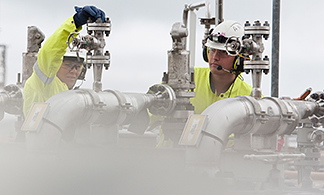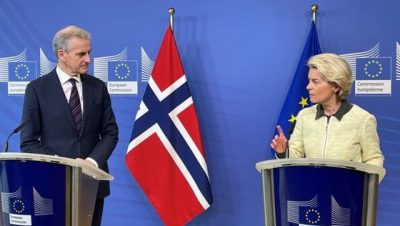Norwegian gas installations, universities, government websites and banking systems are among those urged to boost their cyber defense, for fear of potential Russian attacks. On what top officials called “a dark day for Europe,” after Russia invaded Ukraine during the night, Norway’s gas production and delivery have been singled out as a target for disruption.

Few think Russia will invade its other neighbours, including Norway, after Russian President Vladimir Putin finally launched his long-anticipated invasion of Ukraine. Putin, angry and feeling threatened by the expansion of NATO and the emergence of democratically elected governments along Russia’s borders, is now intent on retaining some “sphere of influence” through control over Ukraine.
Norwegian Prime Minister Jonas Gahr Støre quickly joined other leaders around the world in condemning Russia’s invasion and attacks that were extending far beyond disputed regions in eastern Ukraine. “This violates Ukraine’s rights as a sovereign nation,” said Støre. “We have to go back to World War II to see the extent of this type of invasion.”
While Russian military attacks on other bordering countries from Norway in the north to Romania in the south are unlikely, because they’d spur a military response from NATO, cyber attacks remain likely. Germany has already halted its Nord Stream 2 gas pipe project with Russia and other EU gas imports from Russia can be cut off as part of economic sanctions against Russia. That leaves Norway as the next-biggest supplier of gas to Europe, and Russian officials may try to disrupt it as a form of retaliation.
“Control over energy is an important part of the strategic thinking on the Russian side,” Jakub Godzimirski, a researcher at Norwegian foreign policy institute NUPI, told newspaper Klassekampen just before Russian tanks rolled over border into Ukraine.
“Europe can manage without Russian gas for a short period,” said Godzimirski, who specializes in energy resources’ role in Russian political strategy. “But by summer it will be necessary to fill up its gas supplies to meet next winter.”
The EU will need all the gas it can get from sources other than Russia, and European Commission President Ursula von der Leyen met with Prime Minister Støre in Brussels on Wednesday. She specifically mentioned Europe’s need for Norwegian gas, while Støre called the EU “Norway’s most important market.”

That also makes Norwegian oil and gas production an attractive target for Russian cyber attacks, according to Godzimirski. “Norway must expect that cyber attacks will come against its oil and gas infrastructure,” he told Klassekampen. He pointed to research that documents how cyber attacks are among methods used by Russian authorities to further their agenda when diplomacy doesn’t achieve their desired results. Threats and sabotage are other options.
Norway’s national security authorities and intelligence agencies have long listed Russia and China as posing the greatest threats to Norway and other democracies. They raised their threat warnings earlier this month, “The intensity of superpower rivalry is increasing,” claimed Nils Andreas Stensønes, who heads Norway’s military intelligence agency E-tjenesten, adding that Russia and China (which have recently become much more friendly than in earlier decades) “are using everything they have in their toolboxes.”
Raising alarms
Norway’s national security authority (NSM) also has been warning about potential hacker attacks, not least after widespread cyber attacks on government websites in Ukraine prior to Russia’s invasion. Russia consistently denies being behind those attacks and others, also in Norway, but they’ve raised alarms.
Newspaper Aftenposten reported late last week that Norwegian universities that have been working with academic counterparts in Ukraine, for example, have been warned. Kjetil Are Lund at the OsloMet told Aftenposten that Norway’s national cyber security center (NCSC) has urged all of them to evaluate their risk and sharpen routines.

Foreign policy institute NUPI itself has also received warnings from NCSC about “a higher threat situation in connection with the tension in Ukraine,” according communications chief Åsmund Weltzien. NUPI has taken steps, he told Aftenposten, to raise its technical security level. Norway’s public health institute FHI has, too, given its cooperation with Ukraine’s Public Health Center. Norwegian financial institutions are also on alert, given the cyber threat and concerns Russia may try to destabilize other parts of Europe as it grabs power in Ukraine.
“All operations that are dependent on information technology, or have ties to Ukraine, must be aware that cyber attacks on Ukrainian institutions can also have consequences for them,” Anniken Beyer Fjeld of NSM told Aftenposten.
Tore Nyhamar of Norway’s defense research institute (Forsvars forskningsinstitutt, FFI) also pointed to the potential for hybrid warfare. “In Europe people are worried about a hybrid strategy … where military power is supplemented by cyber attacks, manipulation of information and threats to stop the supply of oil and gas to Europe” Nyhamar wrote in a commentary in Aftenposten late last week.
Nyhamar raised concerns that Putin’s main goal is to divide Europe and, ultimately, Europe and the US. “Putin’s hybrid strategy can be a means of achieving just that,” he wrote.
newsinenglish.no/Nina Berglund

